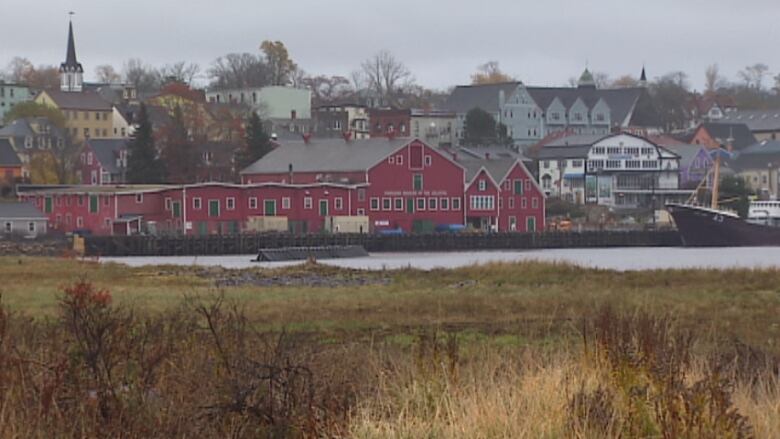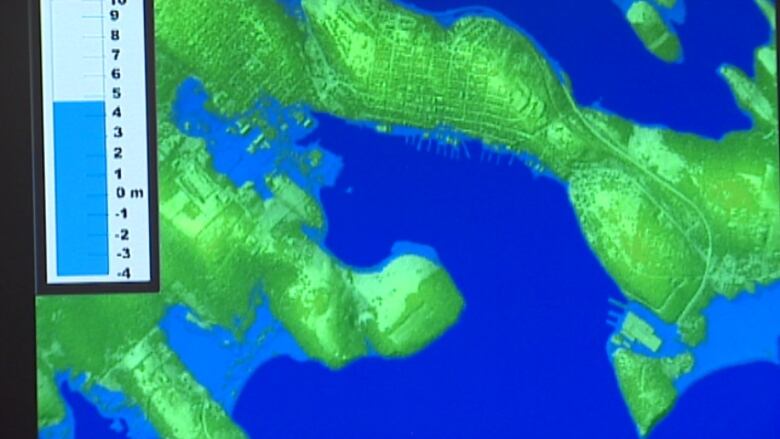Lunenburg braces for climate change
Iconic seaport asking for help to prep for rising sea levels

The iconic Nova Scotia fishing port of Lunenburg is asking for help dealing with the impact of an ocean borne double whammy facing coastal communities across Atlantic Canada: rising sea levels due to climate change and storm surges.
But Rachel Bailey, the mayor of Lunenburg, said it may be too soon to talk about erecting dikes around the UNESCO World Heritage site.
"That certainly would change our viewscape for the town. I'm not sure," Bailey said.
The home port of the Bluenose II issued a request for proposals Tuesday to develop a climate change action plan.
"The effects of climate change are bound to be very significant for us so it's important for us to know how significant and what the possibilities might be to plan for changes," Bailey told CBC News.
Lunenburg does not have a choice in the matter.
Nova Scotia is the first province in Canada to order its municipalities to develop a climate change action plan. The money for the studies expected to be approximately $40,000 for Lunenburg will come from federal gas tax revenues administered by the province. Fixes are also eligible for funding from gas tax revenues.
Service Nova Scotia and Municipal Relations has said the risks include streets, power poles and wastewater systems close to the coastline. It also wants municipalities to protect the access roads that connect communities and residents, such as the elderly during heat waves.
"Unfortunately, they ask you to spend the money in order to get the money. So we're spending gas tax money in order to secure more gas tax money in the future," said Bailey, who agrees the town needs to plan.
'We must start now'
Eric Rapaport, an associate professor at Dalhousie University, has studied the impact of climate change on Lunenburg and surrounding areas. He said models are predicting a sea level rise of one metre over the next century. That, coupled with stormsurges, poses the problem.
"We need to begin to adapt our infrastructure and our communities to those types of scenarios," Rapaport told CBC News.

"We must start now. We can't do this overnight and we're talking about a lot of investment and intergenerational costs that will be endured by the current generation and the next generation in order to prepare for such things."
Rapaport said Lunenburg is already vulnerable to storm surges of the type seen 10 years ago when Hurricane Juan slammed into Halifax, causing wide spread damage. He said Lunenburg was lucky that day.
Rapaport said the town's finger piers are most at risk but so is the low-lying Tannery Road area, the location of a new Grade Primary to Grade 9 school Bluenose Academy which opened in 2012.
"Can you flood proof the school? Should the school have been located there in the first place?" he said.
"That's a long-term problem that they're going to have to deal with."
Municipalities elsewhere on Nova Scotia's South Shore are also starting to come to grips with the issue. The Bluenose Coastal Action Foundation will be moderating upcoming meetings examining development in coastal areas.
"Every municipality and every resident moving forward has to take into account the impacts of climate change and the possibility of increased storm surge and rising sea levels," said Brooke Nodding, the executive director of the Bluenose Coastal Action Foundation.
"Any new infrastructure or even rebuilds will have to take that into account and consider setbacks if they're along the coast."












_(720p).jpg)


 OFFICIAL HD MUSIC VIDEO.jpg)
.jpg)



























































































